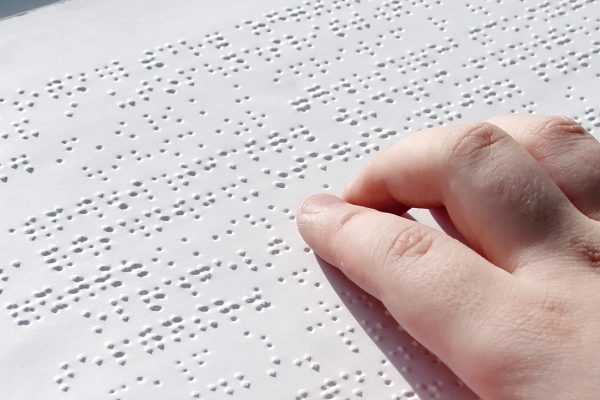
Just because people lose their sight doesn't mean that they can't read anymore. They just learn to read in a different way. Blind people read by running their fingers over pages that have groups of tiny raised dots. These dots represent different letters, and they form an alphabet that's just like ours. This writing system is called braille. Braille has a very interesting history. Its story begins around 1800, when a French soldier named Charles Barbier created a system of raised dots so that soldiers could read messages in the dark. Napoléon wanted his troops to be able to communicate in the dark without giving away their positions. In the end, this so-called "night writing" system was too complicated for soldiers to learn. It had to be rejected by the military. Years later, Charles Barbier met Louis Braille at the National Institute for the Blind in Paris. Louis Braille had been blind since the age of four, and he immediately ecognized both the potential importance of Barbier's system and its major flaw. Louis set to work on making it easier to use, and eventually the braille system was born. In braille, each letter, or cell, is made up of a rectangle in which there can be a combination of up to six raised dots or an absence of dots. The six dots are arranged in a grid of two dots horizontally by three dots vertically. The dots are numbered 1, 2, and 3 from top to bottom on the left column and 4, 5, and 6 from top to bottom on the right column. There can be 64 different combinations. Braille has also evolved to accommodate differences in other languages. For example, Greek braille is different from Chinese braille. Blind people can also write in braille. Most use a special typewriter, called the Perkins Brailler, which types braille onto paper. Nowadays, computer keyboards with braille symbols are also available. It is amazing that a military technology from the Napoleonic Wars has grown into something that has improved the lives of countless blind people around the world.
失明的人並不代表失去閱讀的能力,只要學習不同的閱讀方式即可。 視障者可藉由指腹觸摸頁面上多組微小凸點的方式來閱讀。這些凸點代表不同的字母,構成像我們一般人所用的字母表。這種書寫系統即稱為「布雷點字法」。 布雷點字法的歷史淵源十分有趣。大約西元1800 年時,法國士官巴比爾創造了點字系統,讓士兵即使在暗夜裡也能讀取訊息。這是因為拿破崙希望軍隊能在行跡不敗露的前提下,於黑暗環境之中通訊。但是這種「夜書」系統過於複雜而難以上手,因此不得不遭到軍方拒用。 多年後,巴比爾在巴黎的國立啟明學校認識了布雷。布雷四歲的時候即失明,他當下體認到巴比爾系統的重要潛力與其主要缺點。他開始著手簡化該系統,布雷點字系統就此而生。 在布雷點字法裡,每個布雷點字「字母」(或稱點字格)均由一個至多可填滿六凸點的長方形所組成(並以各點為凸點與否做變化)。此六凸點長方形的排列方式為每列兩點,每行三點。左行凸點由上到下的編號分別為1、2、3,右行凸點由上到下的編號分別為4、5、6,共有64 種不同組合。布雷點字法亦因應不同語言而有所調整。舉例而言,希臘文點字法就與中文點字法不盡相同。 視障者同樣能透過布雷點字法來書寫文字。多數視障者使用一種特殊的「柏金斯點字機」(Perkins Brailler),此打字機能將布雷點字打在紙張上。現在市面上也有配備布雷點字符號的電腦鍵盤。 布雷點字法由拿破崙戰爭使用的軍事技術所演化而來,竟然改善了全球無數視障者的生活,著實令人驚奇。 |
沒有留言:
張貼留言